One would probably not expect to find that a young Italian woman is one of the most enthusiastic promoters of the spiritual writings of Father Jean-Jacques OLIER, but that is indeed the case.
Ms. Mariel MAZZOCCO, with the permission of the Society of Saint Sulpice, has recently published three volumes of the writings of Father Olier (listed below and, so far, only available in French) to promote a wider dissemination of their spiritual message.
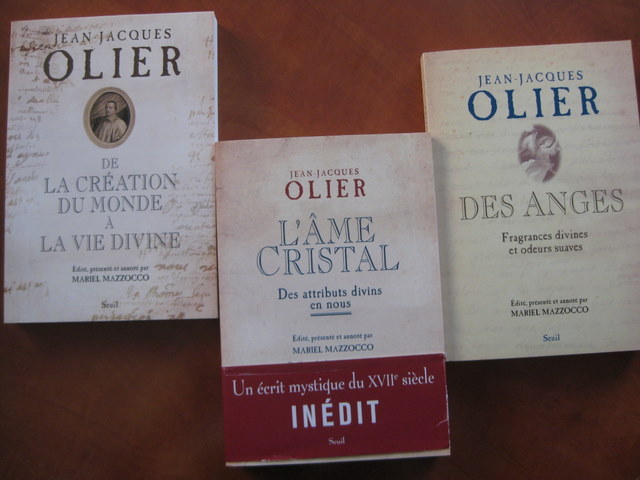
The petite and sometimes bespectacled researcher is actually quite familiar with France and French culture, since her mother is French. Ms. Mazzocco often comes to Paris from her home in Italy to conduct research in the Sulpician archives and library housed in the 6th arrondissement in the heart of Paris. She recently shared with the Superior General, Father Ronald D. WITHERUP, pss some of her thoughts on why she considers Father Olier so important and inspirational today.
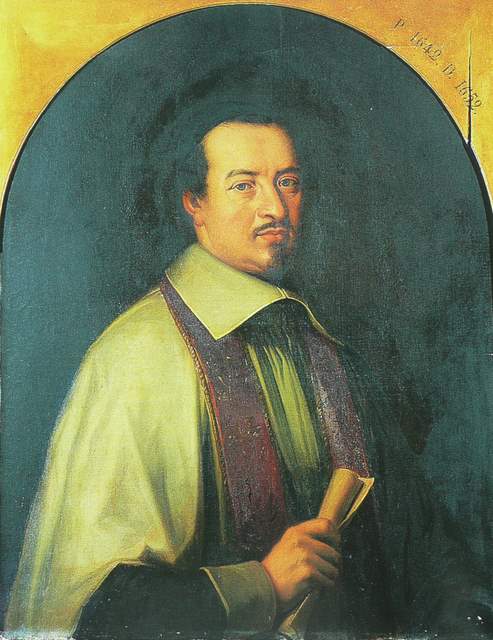 Portrait of Father Olier (1608-1657)
Portrait of Father Olier (1608-1657)
Being a specialist in mystical literature of the “modern” era, Ms. Mazzocco enthusiastically recalled how delighted she was to discover Father Olier’s writings and to have the opportunity to update and publish the previously unedited manuscripts. She also noted that Olier has been called by some—most notably Henri BREMOND in 1921—“the poet of the French school,” owing to his mystical vision, his lyrical style and poetic expressions. She believes now that these new publications confirm this judgment.
Among other examples of Olier’s lyrical style, she cites a passage from the most recently published treatise on the angels. Olier speaks of the choirs of angels as “subtle beings, like ‘perfumes’ of the divine being, fragrances that cling to God, inferior beings though they are, to adore Him, know Him better, and love Him” (Des Anges, p. 211).
A second aspect of Olier that Mazzocco finds attractive is his deep spirituality, which she believes has a universal dimension that touches the modern world, despite our distance from the 17th century. As an example, she cites a passage from Olier’s work, “The Crystal Soul”:
“God is loved from one end of the world to the other; he is enormously loved. God is loved in a French person, in a Turkish person, or in a Japanese person. God is loved infinitely in all of them. And the soul that allows itself to participate in the love that God holds for each person also loves each neighbor immensely in God, because the soul loves God who is infinitely kind” (L’Âme cristal, pp. 229-30).
Granted that Olier’s language is sometimes more ornate than that of the 21st century, Mazzocco believes Father Olier’s sentiments are actually at home in our multicultural and pluralistic world.
Another aspect of Olier’s vision touches the lives of priests directly. Mazzocco points to Olier’s insistent combination of contemplation and action, of community life and solitary prayer. He was a busy pastor of the Church of Saint Sulpice, who considered himself always a “pastor of souls.” At the same time, he had a deep personal spirituality, and he emphasized the importance of spiritual direction, meditation, and regular prayer, especially for priests. Moreover, Mazzocco believes that Olier’s love of scripture, and his advice to read and reflect on the Bible regularly, still offers sound advice to priests today.
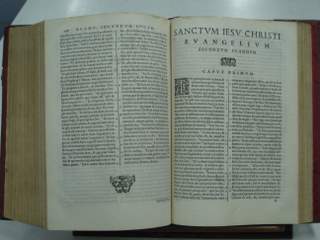 Father Olier’s Bible, Sulpician Archives
Father Olier’s Bible, Sulpician Archives
Mazzocco points to yet a fourth aspect of Olier’s writings. She finds in them evidence of a “universal vocation” to evangelize, to spread the gospel of Jesus Christ to the ends of the earth. She notes Olier’s own desire (never realized in his life time) to be a missionary. Yet already in the year of his death his followers had gone to Canada (1657), and today Sulpicians work on five continents and fourteen countries, doing the ministry of initial and ongoing formation of priests. She cites favorably Olier’s self-described evangelistic attitude: “I want to communicate all the truth that God has allowed me to know and to spread it into the heart of everyone, especially to those who have to teach.”
One challenge Ms. Mazzocco has faced is the relative lack of familiarity today with the writings of the French school and of Olier, in particular. But this is indeed the reason she desires to continue her research. She wants to help make Olier better known as the spiritual master he was.
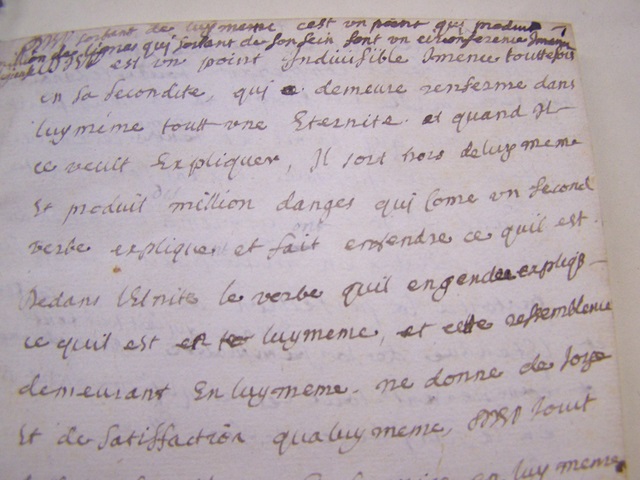 Manuscript of Father Olier’s Text on the Angels
Manuscript of Father Olier’s Text on the Angels
Following are the books of Father Olier, edited by Professor Mariel Mazzocco and published in the last three years:
►Jean-Jacques Olier, L’Âme cristal. Des attributs divins en nous, édité, présenté et annoté par Mariel Mazzocco, Paris, Seuil, 2008 (avec une préface de Jacques Le Brun).
►Jean-Jacques Olier, De La Création du monde à La Vie divine, édité, présenté et annoté par Mariel Mazzocco, Paris, Seuil, 2009.
►Jean-Jacques Olier, Des Anges. Fragrances divines et odeurs suaves, édité, présenté et annoté par Mariel Mazzocco, (avec un avant-propos de Maurice Olender), Paris, Seuil, 2011.
Professor Mazzocco is currently working on several other publication projects on the writings of Father Olier. A fourth volume, devoted to the theme of “diabolical temptations and divine possession” and to be published by Éditions Honoré Champion, will appear in 2012. She also recently obtained permission from the Sulpicians to edit a volume of Father Olier’s smaller, unpublished spiritual treatises on various themes that originated as conferences. It will likely appear in 2013.
All of the current volumes are easily available through bookstores, Amazon.com, or through the publishers directly.
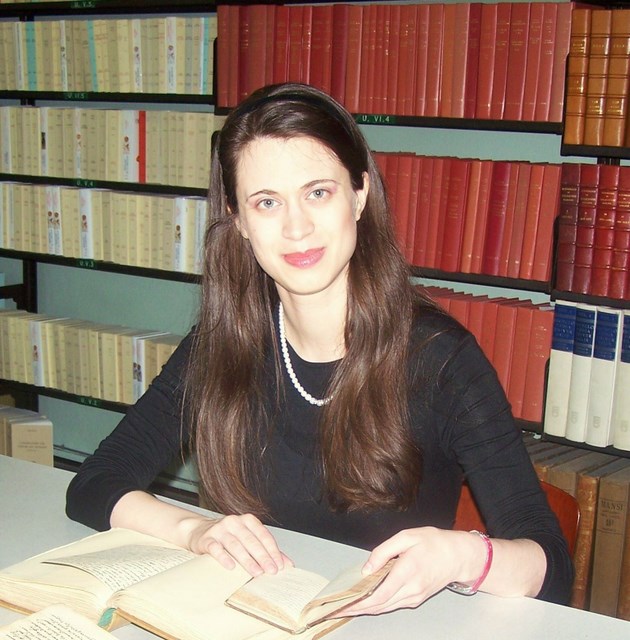 Ms. Mazzocco Researching
Ms. Mazzocco Researching
The Society of Saint Sulpice is grateful for the dedication of this singular researcher, and we wish her ongoing success in her efforts to promote the spiritual vision of Father Olier.


